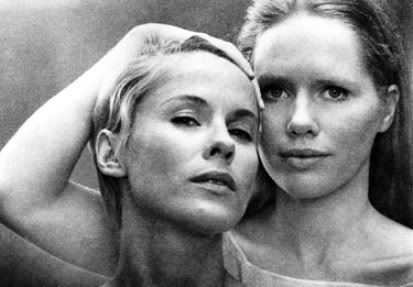I actually see Through a Glass Darkly as richly cinematic, especially considering the sparse cast and fixed location. Nykvist's camera moves quite a bit, but is never obtrusive and he still captures the beauty and austerity of the location quite well (and in natural light, too.)ChiO wrote:Like Mr. Arkadin, I found [Through a Glass Darkly] uncinematic.
Bergman does a lot, too with his placement of actors in particular scenes. In the boat where Max confronts Gunnar about his diary it's a two-shot, but during Gunnar's confessional, he's isolated in a single close-up. Indeed, Gunnar seems to be the odd man odd in many shots, including the play (yes, he's the only audience member, but there's barely an establishing shot from behind him that also includes the stage and instead we see the actors (and musician!), and then Gunnar's reactions.)
Granted, Bergman does use a few lengthy one-shots, mainly of Harriet when she's alone. Most notably, perhaps, is when she discovers her father's diary, but even here Nyvist's camera moves ever so slow slowly in. In any case, Harriet's performance throughout is so nuanced and perfectly paced that an arbitrary cut in the oner would ruin the achieved effect.
While Through a Glass Darkly is (one) of my favorite Bergman films, the coda just doesn't work. The Sunday School-ism sounds good but actually means nor answers anything and raises more questions (which, maybe, are answered in Bergman's next film.)
I do, however, really like my man Gunnar's character and how he, as an artist, feels guilt over stealing the lives of his friends and loved ones for his art (like Bergman himself?) That scene after he gives the gifts, which he knows are worthless, and sobs in his room (and even extends his arms in a cross--too much?) pretty much defines his character. And, as mentioned, Harriet gives one of her finest performances.

